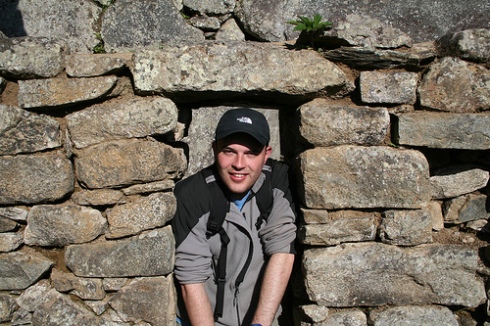Photo by Matt Rubens at Flickr.com
Sts. Clare & Francis
August 25, 2013
21st Sunday in Ordinary Time
Isaiah 25:6-9
Hebrews 12:5-7, 11-13
Luke 13:22-30
Homily by Frank Krebs
Vision Statement
The background for tonight’s gospel is an ancient “vision statement” from the prophet Isaiah (our first reading).
On this mountain the Lord of hosts will make for all peoples
a feast of rich food, a feast of well-matured wines,
of rich food filled with marrow, of well-matured wines strained clear.
And he will destroy on this mountain
the shroud that is cast over all peoples,
the sheet that is spread over all nations;
he will swallow up death for ever.
Then the Lord God will wipe away the tears from all faces,
and the disgrace of his people he will take away from all the earth,
for the Lord has spoken.
It will be said on that day,
Lo, this is our God; we have waited for him, so that he might save us.
This is the Lord for whom we have waited;
let us be glad and rejoice in his salvation.
(Isaiah 25:6-9[i])
Over time there became a kind of tension around this passage. On the one hand it speaks of all people enjoying this feast, evidencing the universality of God’s embrace. On the other we see a reference to God’s people as the ones being saved in this picture. The question becomes: are all people God’s people. Or does “God’s people” refer just to the Israelites?
So in tonight’s gospel someone asks Jesus, “Lord, will only a few be saved?” (Luke 13:23) It may seem at first glance like Jesus responds that only a few will make it, but that’s really not what he is saying at all.
One at a Time, Individually
He says, “Strive to come in through the narrow door.” A narrow door is one through which everyone must pass individually; a whole group cannot come in at once. “Many…will try to enter and will not be able,” to enter as a group that is. But also he says “strive” for it is essentially difficult for us to be responsible for our own individual behavior.
It’s easier to understand this if we look at what a wide door might mean to Jesus’ hearers—then and now. What group thinks it is heading toward the banquet of God’s goodness as a group? Jesus points out that some of his contemporaries think it is enough to be the descendants of Abraham, Isaac, and Jacob. The artist Luke also “paints the picture” so that his readers, who study the scriptures and break bread together at the eucharist each week, can’t get away with saying, ‘We ate and drank with you, and you taught in our [neighborhood].’
That’s the wide door that doesn’t work; we don’t come to the banquet, the goal of history, based on our group identities.
To come in the narrow door means to come in as an individual. In the context of Jesus’ teaching that means to ask the question of myself, “Do I right now in the present hear the urging of God and act on it?” And what is God urging? God is urging that we put the vision statement into practice now. If all are invited to God’s life, then all are invited to share mine. The banquet of life does not exclude anyone based on their group identity. If our mission statement is that all are welcome and that all have dignity and that no one is higher or lower than anyone else—then I must make that my mission statement. And I must act on that now if that mission is ever to be fulfilled. And when I find myself wandering from the vision I must turn and go back to the vision for that is the only door that works.
Noticing Our Group Identity Glasses
There was a woman columnist who was reflecting on the rodeo clown incident at the Missouri State Fair. This columnist is no friend of President Obama. But because she was a woman, she said, if the situation were different, she could understand the brouhaha better. If we finally had a woman president and a rodeo clown put on the mask of the female president and invited an overwhelmingly male crowd to approve of bulls running over her, she imagined how she would feel as a woman. It’s not like there is no history of violence against women. People who are “below the line” on the social “who’s-up-and-who’s-down?” chart understand these things. There are lots of masks that rodeo clowns could be wearing.
And funny thing is, they are usually group identity masks. That is, in most people’s minds, people should be excluded based on broad group identities, just like they think that they should be accepted based on broad group identities. This is what privilege is all about. To enter the narrow door is to practice the mind of God—which is different from our mind—every single day, each of us, regardless of what everyone else is doing. Everyone gets my respect. I am not above anyone. I am not below anyone. Only those of us who finally get this in our souls would ever even want to sit down at a banquet with people who don’t look and act and think like us. We are being transformed now so that we will even want to be at a party like that.
Isaiah and Luke Want to Correct Our Vision
If God had God’s way, we learn tonight, we would neither be included nor excluded based on group identities. We are headed toward the banquet (and the world is headed toward the banquet) every time we appreciate the precious nature of the person right in front of us now.
The Eucharist which we are about to celebrate symbolizes this well. And Christ, who has called us together and who is present with us, is able to transform us into a people who move beyond group identities. Amen?
[i] This is a fuller, richer statement of what we see in the first verse of what was supposed to be tonight’s first reading, Isaiah 66:18; that is why I substituted it. fk



